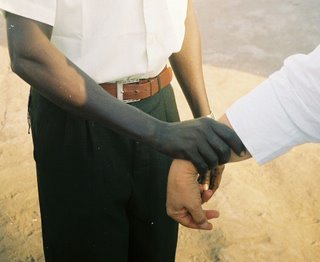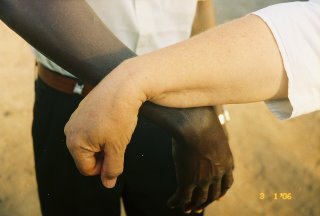The Moru are hand-shakers! Whether you’re greeting adults in church or on the road, or greeting children, it seems that everyone wants to shake hands. And my sense is that this is not merely an empty business ritual, but an important way of connecting and touching one another. I wish we could give hand-shaking classes to everyone who’s getting ready to visit Lui.
First, you need to know there are “rules” based upon whether your hands are clean or dirty – or which hand is dirty – and how friendly you are with the person with whom you’re shaking hands.
The “standard” handshake is a very warm one, but in three parts. The first part is the usual American handshake, but then you move into a second position where your thumbs interlock, then back to the typical American handshake. But to show friendship, you maintain that last position for a very long time, or – while shaking hands with your right hand – you also grasp the person’s forearm with your left hand.
I gather the Moru are well aware of sanitation issues posed by their lack of eating utensils, toilet paper, etc. So if you know your right hand is not clean, you assume the position Deborah (with the “white” hand) is displaying here.

If the person you’re shaking hands with also has a “dirty” right hand, s/he will assume this position:

But in either case, you are maintaining contact. This seems to be very important to the Moru. I was surprised, as we moved about the Lui region, that it was not just adults – but even very small children – who wanted to shake hands. It’s not just “ceremony.” And it’s certainly not perfunctory! If I perceived the practice correctly, it’s a fundamental human “touch” and “acknowledgement.”




No comments:
Post a Comment